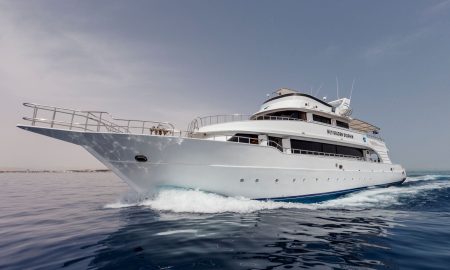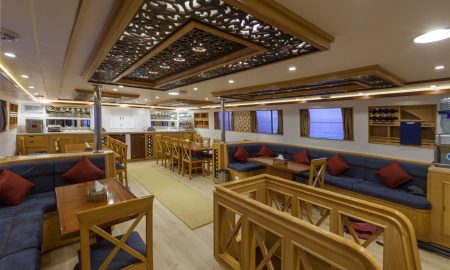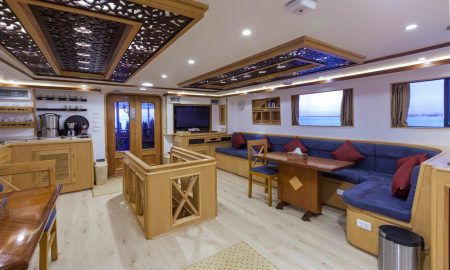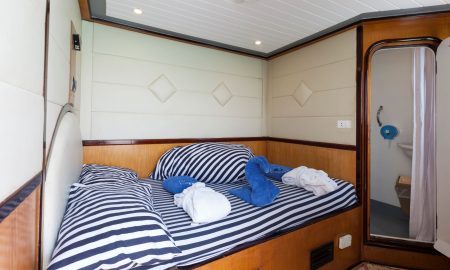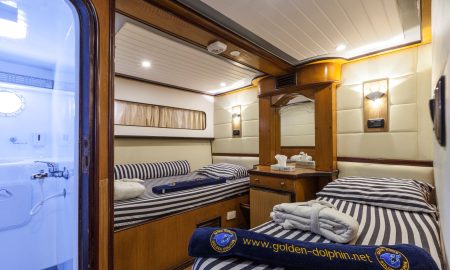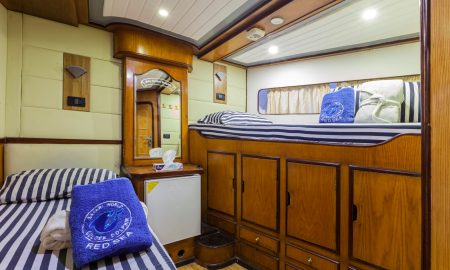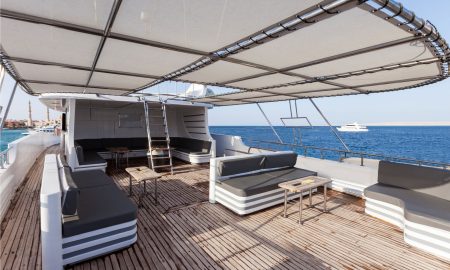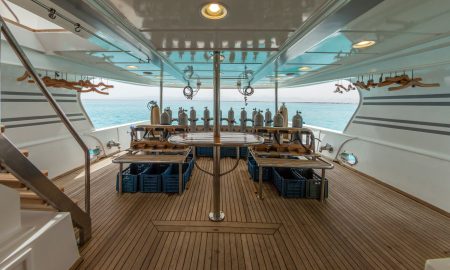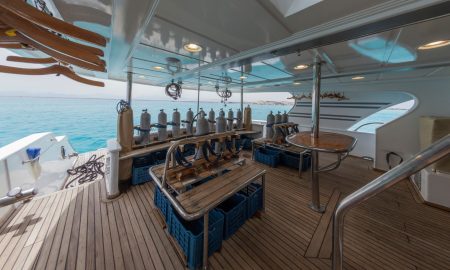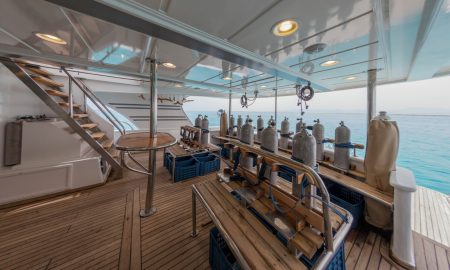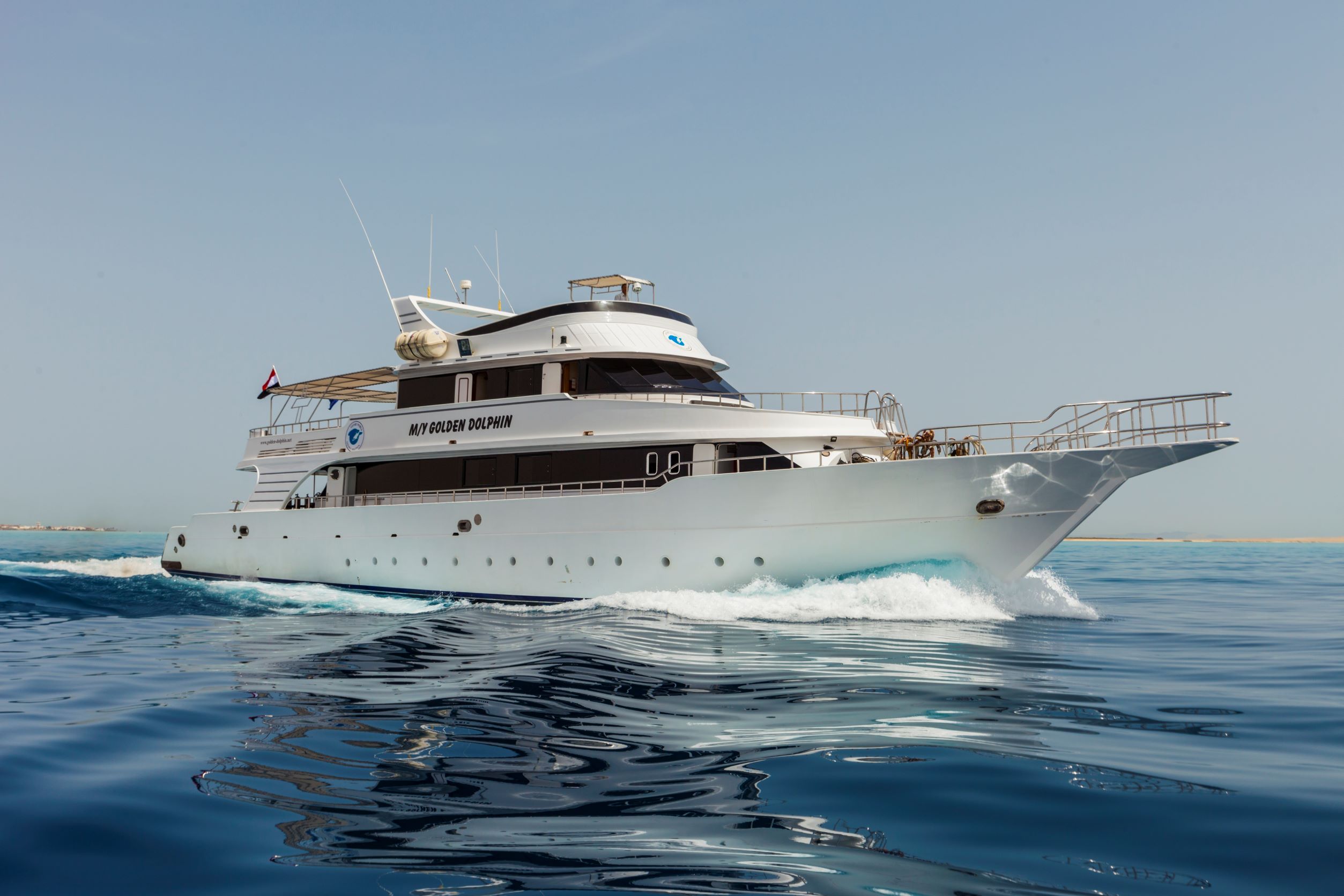
Golden Dolphin I
Liveaboard
Diving experience
The Golden Dolphin I is the first boat in the Golden Dolphin Safari World fleet, was built in 2003, refurbished in 2007 and equipped to meet the special requirements of divers - from the spacious dive deck with large platform to the comfortable sun decks.
A maximum of 20 divers can be accommodated on the 36-meter-long ship in 10 air-conditioned cabins.
The large air-conditioned saloon with bar - naturally with TV/video/DVD and stereo system - as well as the large and comfortable sun decks are available for a cozy get-together in a family atmosphere.
CABINS
- 10 cabins with space for a total of 20 guests
Upper deck: 2 cabins with double beds
Lower deck: 8 cabins with single beds
All 10 air-conditioned cabins on the Golden Dolphin I are equipped with a minibar and a private bathroom with shower/WC.
EQUIPMENT
- Salon: The large air-conditioned salon has its own dining area as well as an entertainment system with TV/video, DVD, home cinema sound system, a Play Station 2 and a bar
- Sun decks: The 2 large and comfortable sun decks of the Golden Dolphin I invite you to relax and sunbathe from dawn to dusk.
CULINARY
- The dining area, which is integrated into the saloon, offers enough space for all guests at 2 large tables to enjoy meals together in comfort. Water, tea, coffee and soft drinks are also included in the full board. There is a Nespresso machine on board, you are welcome to bring your own capsules.
TECHNICAL DETAILS
- Year of construction: 2003 / 2007 overhauled
- Length: 36 meters / Width: 7.5 meters
- Generators: 2 x 65 KW (230V) Perkins
- Engines: 2 x 650 hp Cummins K19
- Desalination unit: 2 x 4,500l/day
- Compressors: 2 x Bauer Mariner
- 2 inflatable boats with outboard motor
SAFETY
- 2 life rafts, life jackets, oxygen & first aid equipment, fire extinguishers in each cabin and in the saloon
PAYMENT ON BOARD
- Euro, US dollar, Egyptian pound
- Credit cards are not accepted
The Golden Dolphin I departs from Hurghada or Port Ghaleb in Marsa Alam on its mostly one-week tours and sails to all the popular routes in the Red Sea to experience the most beautiful and impressive dive sites with its divers.
- Dive deck: The ship has a spacious dive deck and a roomy platform for easy access to the diving experience ahead.
- Nitrox: Nitrox is available free of charge to all divers with the appropriate certification.
ROUTE EXAMPLES
- North - Wreck Tour / North - SS Turkia / North - Strait of Tiran
- Brother Island - Daedalus - Elphinstone / Brother Islands - Daedalus - Fury Shoals
- Rocky Island - Zabargad - St. Johns
- Best of the Red Sea: Daedalus - Rocky Island - Zabargad - St. Johns - Elphinstone
- Deep South: St. Johns - Abu Fandera
- 2 weeks Great Island Tour: Brother Islands - Daedalus - Rocky Island - Zabargad
- 2 weeks: Strait of Tiran - Brother Islands - Daedalus - Rocky Island - Zabargad - Salem Express
- St. Johns - Elba Reef
You can view the detailed routings, dates and availability directly below and send us your inquiry for your next diving vacation at any time:
Routing and availability
The Golden Dolphin fleet sails a wide variety of routes in the Red Sea.
You can find more detailed information about the routes, dates and availability in the overview above or you can also enquire at any time via office@maldivesandmore.com.
Enclosed you will find a few routing descriptions:
North - Wreck Tour
- The Blue Thistle, as Thistlegorm is called in German, is probably the most famous wreck in the Red Sea. The British ship was on its way to Egypt to supply the British Africa Corps with supplies when it was attacked by a German bomber on the night of the full moon on October 6, 1941 and sank. The wreck lies upright on the seabed at a depth of 30 meters and makes many a diver's heart beat faster.
- The Abu Nuhas reef north of Shedwan Island seems to be cursed, because although its beacon shines far and wide, it is home to four very famous wrecks that attract divers from all over the world.
- A fascinating story revolves around the steamship Dunraven, which was transporting wool, cotton bales and spices from Bombay to Newcastle when it ran aground on the reef edge at the southern end of Shaab Mahmoud on the night of April 22, 1876, caught fire and sank.
- Ras Mohammed National Park offers fantastic dive sites, such as JOLANDA and SHARK REEF. The two reefs are close to each other on a plateau whose edges drop off to a depth of more than 700m. Due to the exposed location and the current conditions, the plateau is an "aquarium" of superlatives
North - SS Turkia
- The SS Turkia was built in 1909 by Earles Shipbuilding and Engineering Co. in Hall (England). The cargo ship, then named Livorno, had a length of 91m, a width of 13m and a tonnage of 1671 tons and was used for various trade routes within Northern Europe. Between 1920 and 1935, the ship was sold to Greece and renamed. In May 1941, the SS Turkia was on its way from New York to Piraeus. The cargo consisted of explosives, vehicles, electrical cables and weapons. She sank near the Suez Canal and there are two stories about it: Fire broke out on board and/or she was hit by a bomb and sank. At a depth of between 10m and 24m, beautifully overgrown with soft and hard corals, it is an experience for the diver.
Deep South: St. Johns - Abu Fandera
- St. John's Cave, this chain of five reefs lives up to its name. Umm Hararim impresses with its unique cave system. In the shallow area, surrounded by a wonderful hard coral garden, the main reef is perforated like a Swiss cheese on its south-west side. The corridors, most of which are open at the top, are easy to dive, overgrown with red coral and the play of light on the bright sandy bottom is unique. Hatchetfish gather in darker corners, blue-spotted stingrays search for crabs in the sand......there are desktop pictures!
- Abu Fandera, dozens of ergs (reef blocks) at a depth of 15m to 20m, overgrown with beautiful soft corals, awaken the explorer's instinct.
Brother Islands - Elphinstone
- The Brother Islands are undoubtedly one of the world's best dive sites. Rising steeply from great depths, two small islands, Big Brother and Little Brother, lie isolated in the Red Sea on the open sea, around 60 km from the coast.
- The Little Brother has a surprising abundance of creatures. Steep walls of superlatives await the diver. In the north, a narrow and long plateau stretches from 7 m to over 42 m in depth. Diving there is always a little adventure. Hammerhead sharks often have their rendezvous, but there is also a cleaning station for gray reef sharks, large barracudas are ready to hunt in the current, large Napoleons show themselves off to the diver, silky sharks and thresher sharks sometimes pass by. Especially in the south, turtles can often be observed, a manta ray flies past almost unnoticed in the current, hunting bottlenose dolphins, tuna and mackerel, all of which are possible.
- About one kilometer north of Little Brother is Big Brother. The lighthouse, built in 1883, is located in the middle of the island. The highlight for every diver there is certainly a dive on the wreck of the NUMIDIA. The British steel & screw steamer was on its way from Glasgow to Bombay & Calcutta when it ran aground at full speed on the northern tip of the reef on the night of July 20, 1901. A few weeks later, the Numidia sank and now lies on edge between 12m and 80m deep on the reef.
- Although the reef of Elphinstone has been very heavily dived in recent years due to its location close to the coast, it is undoubtedly one of the most beautiful reefs in Egypt and is a "must be" for every diver. Not very wide, but long, a plateau stretches gradually from 18m to 55m in the north. Beautifully overgrown, it is worth looking out for big fish (gray reef sharks, hammerhead sharks, white tip sharks) before drifting east or west along the breathtaking steep wall, which is overgrown with gorgonians, wire corals and various soft corals. The plateau to the south is slightly wider, covered with coral blocks and turns into a drop-off at a depth of around 45m.
(Source: Golden Dolphin Safari World)
